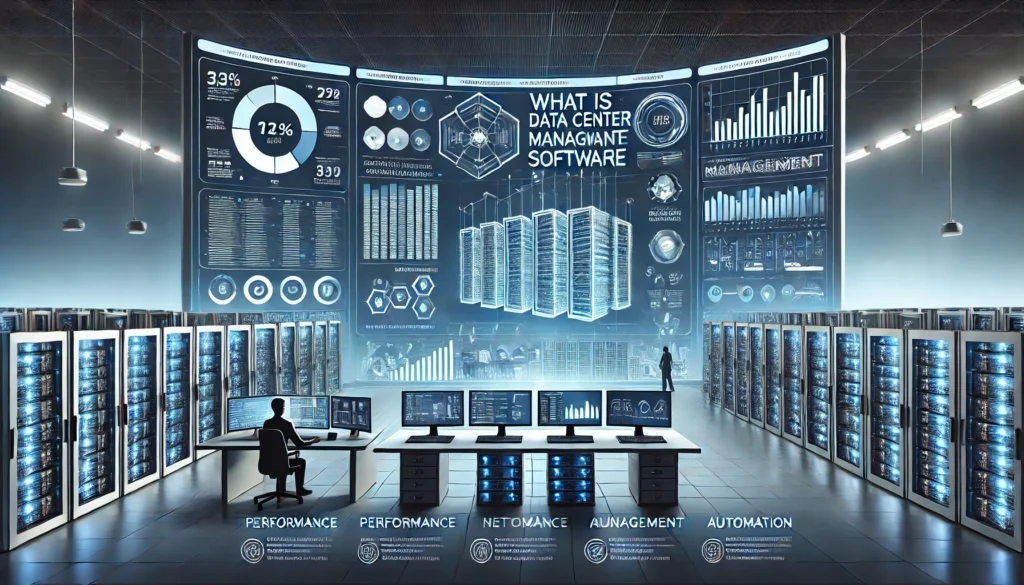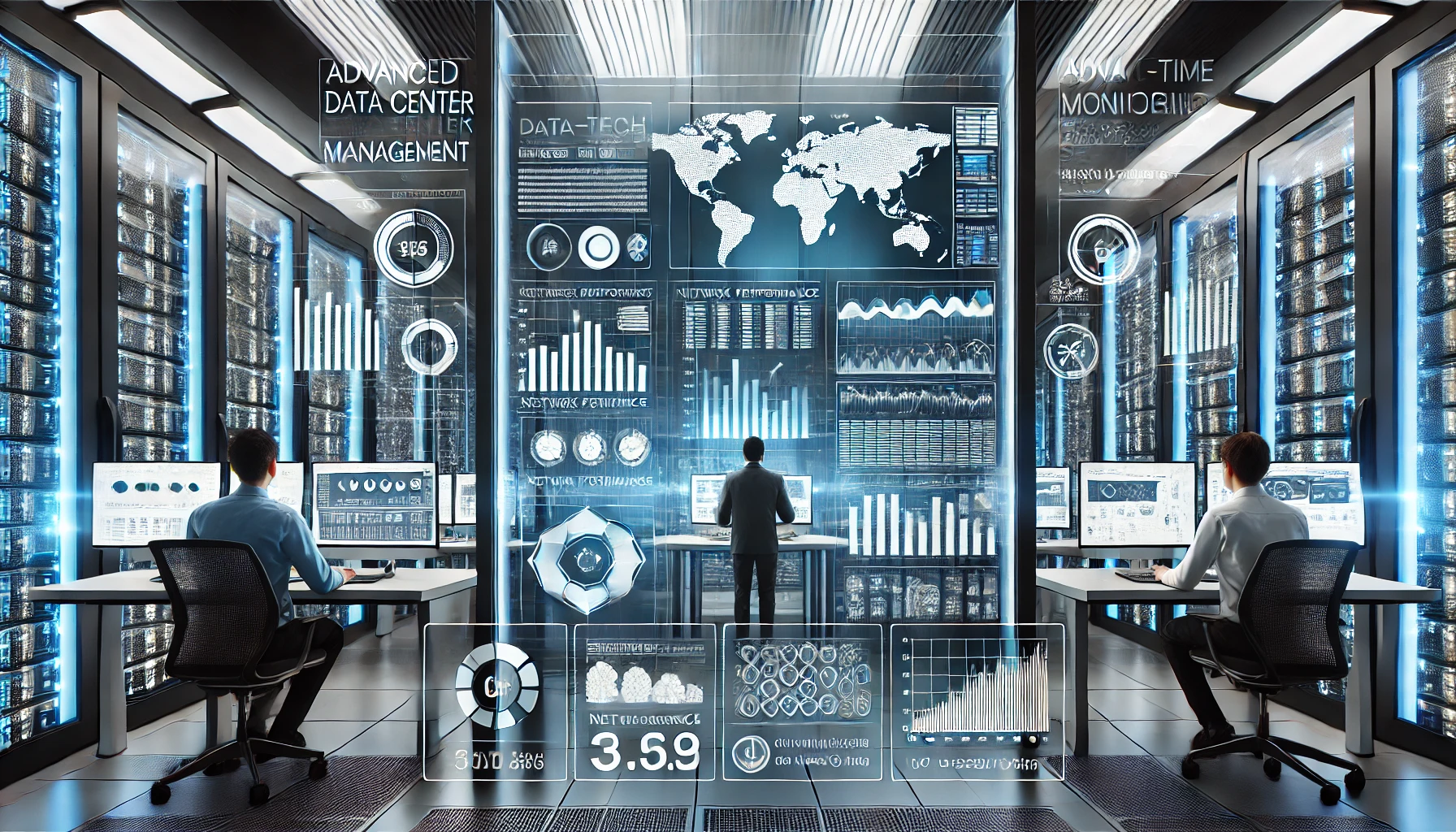Managing a data center is a complex and demanding task that requires precision, efficiency, and security. With massive amounts of data being processed every second, businesses need Data Center Management Software (DCMS) to optimize performance, minimize downtime, and ensure seamless operations.
Whether you run a small business data center or a large-scale enterprise facility, having the right DCMS can significantly enhance operational efficiency and cut down costs. In this comprehensive guide, we will explore:
- What Data Center Management Software is
- The key features and benefits
- How it helps in cost optimization and security
- Factors to consider when choosing the right software
What is Data Center Management Software?

Data Center Management Software (DCMS) is a centralized platform designed to monitor, control, and optimize data center operations. It helps businesses manage:
✅ Servers & Computing Resources – Ensures maximum uptime and performance.
✅ Network Infrastructure – Monitors data flow, traffic, and connectivity.
✅ Cooling & Power Usage – Regulates temperature and optimizes energy consumption.
✅ Security & Compliance – Protects sensitive data from cyber threats.
✅ Automation & Maintenance – Reduces manual effort through predictive analytics and AI-driven workflows.
Data centers house critical IT infrastructure, and DCMS software ensures that everything runs smoothly, securely, and efficiently.
Key Features of Data Center Management Software
1. Real-Time Monitoring and Alerts
One of the most essential features of DCMS is real-time monitoring. IT managers can track:
- Server health (CPU usage, memory, storage)
- Power consumption (voltage, load balancing)
- Cooling systems (temperature control)
- Network status (latency, packet loss)
If any issue arises, instant alerts notify administrators, allowing for immediate action and preventing costly downtime.
2. Asset & Inventory Management
Keeping track of servers, networking equipment, and storage devices is a massive challenge in a data center. DCMS provides:
- A comprehensive inventory list
- Lifecycle tracking for hardware and software assets
- Automatic updates on warranty and maintenance schedules
This reduces the risk of misplaced resources and ensures proper hardware lifecycle management.
3. Energy & Power Management
Data centers consume huge amounts of energy, leading to high operational costs. A DCMS solution can:
- Optimize power usage by analyzing consumption patterns
- Reduce wasted energy through automated power scaling
- Improve cooling efficiency, preventing overheating issues
By using AI-driven energy management, companies can cut electricity costs and reduce their carbon footprint.
4. Automation & AI-Powered Insights
Modern DCMS platforms leverage Artificial Intelligence (AI) and Machine Learning (ML) to automate tasks such as:
- Predictive maintenance – Identifies issues before they cause failures
- Load balancing – Adjusts resources based on demand
- Automated backups & recovery – Prevents data loss
This level of automation reduces manual effort and boosts operational efficiency.
5. Security & Compliance Management
Data centers store highly sensitive information, making security a top priority. DCMS software offers:
- Role-based access control (RBAC) – Restricts data access to authorized personnel
- Threat detection – Identifies cybersecurity risks in real-time
- Regulatory compliance tools – Ensures adherence to GDPR, HIPAA, ISO standards
Having robust security features helps protect business data and prevent costly cyberattacks.
6. Remote Management & Multi-Site Integration
For businesses managing multiple data centers, remote access is a game-changer. DCMS platforms allow:
- Centralized control of multiple sites from a single dashboard
- Remote troubleshooting and on-the-go monitoring
- Cloud-based access, enabling real-time management from anywhere
This is especially useful for global enterprises that require high availability and reliability.
Benefits of Using Data Center Management Software
🔹 Increased Efficiency – Streamlines operations and reduces workload.
🔹 Cost Savings – Lowers energy costs and optimizes hardware usage.
🔹 Minimized Downtime – AI-powered insights prevent system failures.
🔹 Enhanced Security – Protects against cyber threats and unauthorized access.
🔹 Scalability – Supports growing businesses by managing expanding infrastructures.
With the right DCMS solution, businesses can automate repetitive tasks, improve performance, and reduce operational risks.
Also Read: Mobile Inventory Software – The Future of Inventory Management!
How Data Center Management Software Optimizes Costs
One of the biggest challenges of running a data center is high operational costs. Here’s how DCMS helps save money:
✅ Lower Power Consumption – Reduces unnecessary energy usage through AI-powered optimizations.
✅ Automated Cooling Adjustments – Regulates temperature based on workload, saving electricity.
✅ Predictive Maintenance – Prevents hardware failures, avoiding costly emergency repairs.
✅ Optimized Workflows – Reduces the need for manual intervention, cutting labor costs.
By integrating DCMS, businesses can increase profit margins while maintaining high performance.
How to Choose the Right Data Center Management Software
When selecting a DCMS, consider the following:
🔹 Scalability – Can it grow with your business?
🔹 Integration – Does it support existing hardware and software?
🔹 User-Friendly Interface – Is it easy to use for IT teams?
🔹 Security Features – Does it offer data encryption and multi-layer protection?
🔹 Support & Updates – Does the provider offer regular updates and customer support?
Popular DCMS providers include:
- Schneider Electric
- Vertiv
- Nlyte Software
- Sunbird DCIM
- Device42
Each of these solutions offers unique features, so businesses should evaluate their specific needs before investing.
Future Trends in Data Center Management Software
With the rise of cloud computing, AI, and IoT, data center management is evolving. Here are some key trends:
🚀 AI-Driven Operations – More automation, fewer human interventions.
🌍 Sustainable Data Centers – Energy-efficient systems to reduce carbon footprints.
🔐 Advanced Cybersecurity – Enhanced protection against emerging threats.
☁ Hybrid Cloud Integrations – Combining on-premise and cloud solutions.
Companies that embrace these trends will stay ahead in the digital transformation race.
FAQ’s
1. What is Data Center Management Software, and why is it important?
Data Center Management Software (DCMS) is a tool that helps businesses monitor, control, and optimize data center operations. It is crucial because it ensures efficient resource utilization, minimizes downtime, enhances security, and reduces operational costs.
2. How does DCMS help in reducing energy costs?
DCMS monitors power usage, optimizes cooling systems, and automates workload distribution, helping data centers reduce unnecessary energy consumption. By using AI-driven insights, businesses can lower electricity costs and improve overall efficiency.
3. Can Data Center Management Software improve security?
Yes! DCMS includes advanced security features like real-time threat detection, role-based access control, and compliance monitoring to protect sensitive data from cyber threats and unauthorized access.
4. What industries benefit the most from Data Center Management Software?
Industries that rely on large-scale IT infrastructure benefit the most, including:
- Cloud service providers
- Financial institutions
- Healthcare organizations
- E-commerce platforms
- Government agencies
5. How do I choose the best Data Center Management Software for my business?
When selecting a DCMS, consider factors like scalability, integration with existing systems, security features, user-friendliness, and vendor support. It’s essential to choose software that aligns with your business needs and future growth plans.
Conclusion
Data Center Management Software (DCMS) is essential for optimizing data center operations, improving security, and reducing energy costs. It helps monitor power usage, automate workload distribution, and enhance overall efficiency. With advanced security features like real-time threat detection and role-based access control, DCMS protects sensitive data from cyber threats. Industries such as cloud services, finance, healthcare, and e-commerce rely on DCMS to manage large-scale IT infrastructure. When choosing the right software, businesses should consider scalability, integration, security, and vendor support to ensure smooth operations and future growth.




